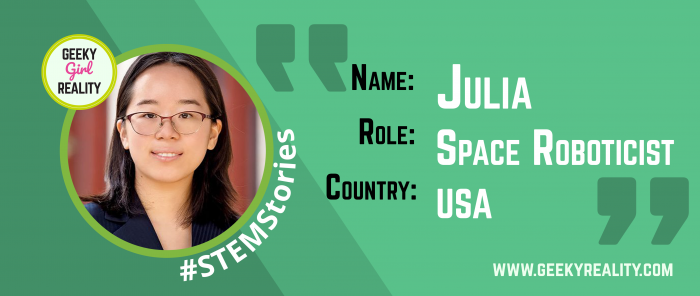 Two years ago, we spoke to Julia, a Space Roboticist from the USA. She graduated in 2018 with a B.S. at Columbia University in Electrical Engineering, where I was dedicated to student activities such as the Columbia Space Initiative, Women in Computer Science, and the student Makerspace.
Two years ago, we spoke to Julia, a Space Roboticist from the USA. She graduated in 2018 with a B.S. at Columbia University in Electrical Engineering, where I was dedicated to student activities such as the Columbia Space Initiative, Women in Computer Science, and the student Makerspace.
1. Introduce yourself, who are you, and what do you do?
I'm Julia, and I am a space roboticist who also loves art and science communication. I’m a NASA Space Technology Research Fellow and this summer I am at the Jet Propulsion Laboratory (JPL), where I work on making cool sensors for even cooler robots. My current project at NASA is with an origami-inspired robot called PUFFER. Outside of that, you can find me at Stanford University, where I'm a PhD student studying robotics. I graduated in 2018 with a B.S. at Columbia University in Electrical Engineering, where I was dedicated to student activities such as the Columbia Space Initiative, Women in Computer Science, and the student Makerspace.
2. How did you arrive at this career (or point in your life/work)? Was it always something you knew you wanted to do?
Oh no, definitely not! I was going to go to an art college for undergraduate studies. I've always thought space and robots were cool, but I never considered actually doing it for a career until I went to college and started the Columbia Space Initiative, now an award-winning engineering student group.

3. What about your job makes you jump out of bed in the morning, especially on those cold, dark mornings?
I love my job because I get to try out cool and crazy ideas. Some of those ideas are bad, some of them are good - and some of them will eventually make it to outer space, your school textbooks, or art museums. What could be cooler than being able to help invent the future?
For the aspiring space roboticists in the crowd, NASA JPL is a great place to be! In addition to PUFFER, there’s plenty of other cutting-edge robots that even interns can work on. For instance, JPL has a team participating in the latest DARPA subterranean challenge called CoSTAR and I have several friends working on this for their internship!
4. What is your personal cure for stress or how do you raise your spirits in times of doubt? Can you share a story?
Everyone experiences stress or self-doubt at least once in their lives. For me, it helps to remember all that my family has overcome to even get to this point. My grandparents are peasant farmers from China, with an elementary school level of education, having dropped out of school to work. My parents immigrated and learned the way of new country, America, where they didn't speak the language and didn't have any money. I am the first in my entire family to be born outside of China. When I am stressed, I remember that I never face my problems alone, and that no problems are truly insurmountable.
5. Who is your role model? If no one, any thoughts on this?
I have had so many role models and mentors to look up to, both in my field and in my personal life, that it's hard to pick just one. Though not all of them may look like me, they all share positive qualities that I hope to integrate in my own life. But my answer would have to be my mother - Chinese culture is traditionally patriarchal, and she broke the mold by raising me to value my independence and self-sufficiency.
6. What advice would you give to yourself if you could go back in time?
I would tell myself, and still tell myself today, to not worry about the future and career paths. It's okay to be unsure of what you want to do, or who you want to be. Keep good company (friends and family) and work hard to support yourself and pursue your goals.
7. Top 3 tips for girls starting out in STEM?
First, focus and learn. No matter how many roadblocks you hit, or how many naysayers you face - if you cultivate your talent in science/engineering/math/technology, you will find a place in the STEM fields. Focus on improving your skills, and don't waste energy on negative influences and naysayers.
Second, speak up. If you come up with an idea, just say it! Don't be afraid of if it's "right" or "wrong" or if a boy is going to say the same idea 10 seconds later. Ask a lot of questions and don't be afraid if some of them seem stupid Often, the "stupid" questions I ask end up being very important because they point out something, some design issue, that everyone else overlooked! You are smart and capable, but you have to show it by advocating for yourself.
Third, use your uniqueness to your advantage. Because of the gender inequity in STEM fields, being a woman or gender minority is an automatic way of standing out in a crowd. Use that to your advantage when meeting people, networking, and learning about new things.
8. How do you measure your success?
By how happy I am to share it with my family and friends.
9. Where can we find out more about your work? For organizations and fellowships that I am part of, you can check out the following links:
PUFFER: https://spectrum.ieee.org/video/aerospace/robotic-exploration/puffer-nasa-origami-inspired-robot
NASA Research Fellowship: https://www.nasa.gov/directorates/spacetech/strg/nstrf_2018/ Brooke Owens Fellowship: http://www.brookeowensfellowship.org/julia-di
Columbia Space Initiative: http://columbiaspace.org
10. Are you social? Will you share your Twitter handle, or LinkedIn profile, or Facebook so that young women can connect with you?
For my social media, you can find me on
Twitter: @astroboticist
Instagram: @astroboticist
LinkedIn: http://linkedin.com/in/JuliaDi

